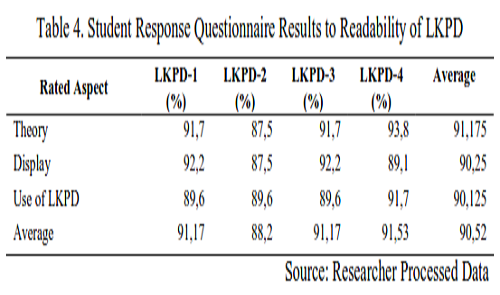
Development of Students Work Sheets (LKPD) with A Problem-Based Learning Model (PBM) in The Context of Riau Traditional Games in Circle Materials
Abstract
Keywords
Full Text:
PDFReferences
Abdurrahman, M. (2012). Pendidikan Bagi Anak Berkesulitan Belajar. Jakarta: Rineka Cipta.
Atika, N., Roza, Y. & Murni, A. (2020). Development of Learning Tools by Application of Problem Based Learning Models to Improve Mathematical Communication Capabilities of Sequence and Series Materials. Journal of Educational Sciences, 4(1), 62-72.
Friansyah, D., Adha, I., & Refianti R. (2018). Pengembangan Pocket Book Berbasis Pendekatan Matematika Realistik Indonesia (PMRI) Materi Bangun Ruang Sisi Datar. Jurnal Pendidikan Matematika, 1 (1), 1-11.
Imayati., Kartini., & Zulkarnain. (2020). Improving Students' Mathematical Understanding by Using Discovery Learning Models in Kampar District High School. Journal of Educational Sciences, 4(2), 357-367.
Kusmaryono, I. (2012). Pengembangan Pembelajaran Matematika Kontekstual Edutainment Berbasis Budaya Lokal di Daerah Bencana. Makalah Seminar Kemendikbud Dikti.
Majid, A. (2014). Strategi Pembelajaran. Bandung: Rosdakarya
Roza, Y., Titi, S., & Syarifah. (2012). Analisis Pemikiran Matematika Pada Permainan Rakyat Daerah Riau Untuk Pengembangan Pendidikan Karakter Dalam Pembelajaran Matematika Realistik. Stranas. Pekanbaru.
Sa’dun, A. (2013). Instrumen Perangkat Pembelajaran. Bandung: Remaja Rosdakarya.
Saputri., L. S., Kristiawati., & Krisnana. (2012). Peningkatan Pengetahuan dan Sikap Dalam Pemilihan Jajanan Sehat Menggunakan Alat Permainan Edukatif Ular Tangga. Jurnalners, 3(2).
Sudijono, A. (2011). Pengantar Evaluasi Pendidikan. Jakarta: Rajawali Pers.
Suryana, M. (2018). Pengembangan Media Pembelajaran Berbasis Permainan Tradisional “Gaprek Kaleng” untuk Menanamkan Konsep Pecahan Siswa Kelas III SD. Jurnal Penelitian Pendidikan Guru Sekolah Dasar, 6(3), 219-228.
Yani, C. F., Murni, A., & Roza, Y. (2021). Development of Mathematic Learning Devices using Discovery Learning Models with Riau Cultural Context to Improve Students 'Mathematic Problems Understanding and Solving Ability. Journal of Educational Sciences, 5(1), 11-22.
Yustianingsih, R., Syarifuddin, H., & Yerizon. (2017). Pengembangan Perangkat Pembelajaran Matematika Berbasis Problem Based Learning (PBL) Untuk Meningkatkan Kemampuan Pemecahan Masalah Peserta Didik Kelas VIII. Jurnal Nasional Pendidikan Matematika, 1(2), 258-274.
Zulfah. (2017). Tahap Preliminary Research Pengembangan LKPD Berbasis PBL untuk Materi Matematika Semester 1 Kelas VIII SMP, Jurnal Cendekia : Jurnal Pendidikan Matematika, 1(2), 1-12.
DOI: http://dx.doi.org/10.31258/jes.5.2.p.374-382
Refbacks
- There are currently no refbacks.
Copyright (c) 2021 Suci Nitia Edwar

This work is licensed under a Creative Commons Attribution 4.0 International License.
Publisher: FKIP Universitas Riau












